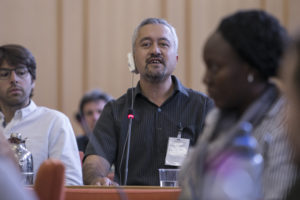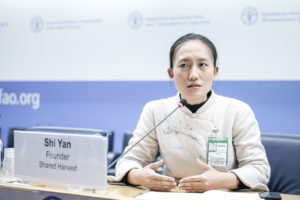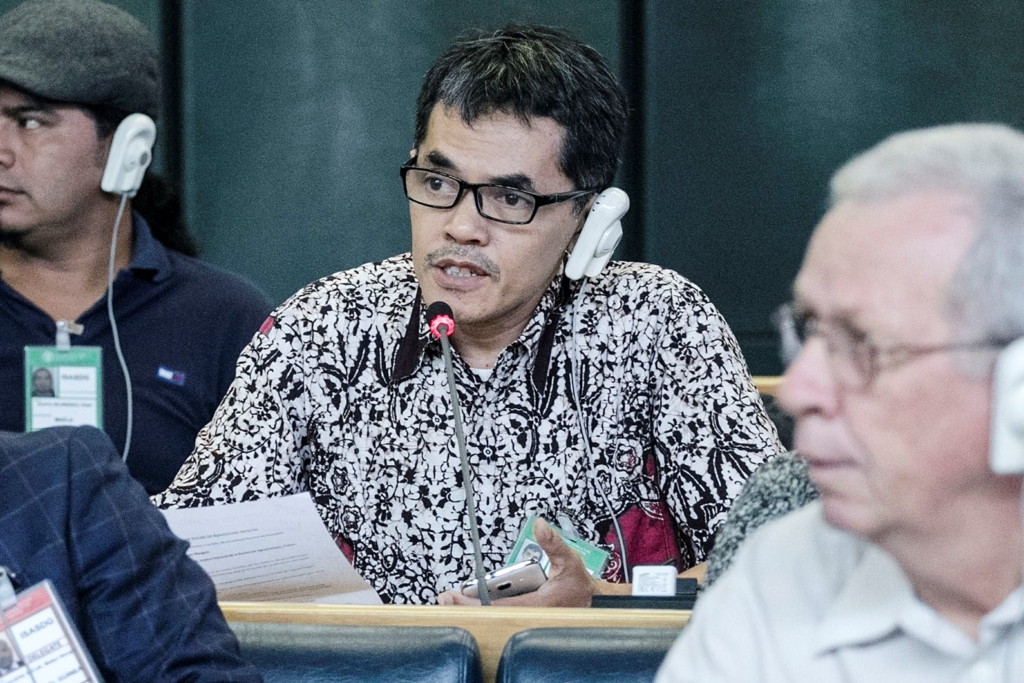April 10, 2018
Rome, 5 April 2018
Intervention by Organizations of Small-Scale Food Producers and Civil Society Organizations at the II International Symposium on Agroecology Convened by Fao
We are delegates of different organizations and social movements of small-scale food producers. We are peasants, fisherfolk and fish workers, indigenous and traditional peoples, pastoralists and nomads, agricultural and food workers, the landless, urban and peri-urban communities living in poverty and food insecurity, consumers, youth, women and NGOs.  Agroecology cannot be understood as a simple set of techniques and productive practices. Agroecology is a way of life of our peoples, in harmony with the language of Nature. It is a paradigm shift in the social, political, productive and economic relations in our territories, to transform the way we produce and consume food and to restore a socio-cultural reality devastated by industrial food production. Agroecology generates local knowledge, builds social justice, promotes identity and culture and strengthens the economic viability of rural and urban areas. This vision, and these principles and common values of Agroecology, agreed upon at the International Forum on Agroecology in Nyéléni in 2015, have been continuously enriched, innovated, adapted, multiplied, implemented in different ways according to our varied realities and respecting our worldviews, cultures, economies and local food systems, based on the real production of agroecological food. Our peoples and organizations are historical subjects who, through their ancestral production systems and struggles, have moved forward in the construction of Agroecology and Food Sovereignty. In other words, it is not something new, it is the fruit of the wisdom of original peoples that is strengthened today with the recovery of traditional practices together with new peasant innovations, caring for Mother Earth and producing abundant healthy food to feed our peoples. We women among us are not objects of policies that want to empower us, but rather we are active subjects of Agroecology and guardians of Biodiversity. We want our central role in food production and in the reproduction of life, as well as in the economy of our families and communities, to be visible and recognized.
Agroecology cannot be understood as a simple set of techniques and productive practices. Agroecology is a way of life of our peoples, in harmony with the language of Nature. It is a paradigm shift in the social, political, productive and economic relations in our territories, to transform the way we produce and consume food and to restore a socio-cultural reality devastated by industrial food production. Agroecology generates local knowledge, builds social justice, promotes identity and culture and strengthens the economic viability of rural and urban areas. This vision, and these principles and common values of Agroecology, agreed upon at the International Forum on Agroecology in Nyéléni in 2015, have been continuously enriched, innovated, adapted, multiplied, implemented in different ways according to our varied realities and respecting our worldviews, cultures, economies and local food systems, based on the real production of agroecological food. Our peoples and organizations are historical subjects who, through their ancestral production systems and struggles, have moved forward in the construction of Agroecology and Food Sovereignty. In other words, it is not something new, it is the fruit of the wisdom of original peoples that is strengthened today with the recovery of traditional practices together with new peasant innovations, caring for Mother Earth and producing abundant healthy food to feed our peoples. We women among us are not objects of policies that want to empower us, but rather we are active subjects of Agroecology and guardians of Biodiversity. We want our central role in food production and in the reproduction of life, as well as in the economy of our families and communities, to be visible and recognized.  Agroecology means that our rights as women are protected and realized, not just as mothers and caregivers of our homes. Agroecology implies our full participation in the social and political life of our communities, ensuring our access to land, water, seeds and means of production with autonomy and freedom. Our equal participation in decision-making spaces is essential. Our peoples and organizations have broadened and deepened their knowledge through collective building and alliances, through dialogues of knowledges between different sectors and generations. For us, scaling up agroecology means having more and more small producers moving forward, and the central ingredient is social organization in our territories. That is to say, our own processes of our organizations of women and men producers, workers and consumers that, build the social, political, economic and cultural fabric that will allow us to advance in the transformation of a failed and harmful industrial agro-food system that damages the environment and the health of our peoples. Any public policy that seeks to support and/or promote Agroecology must be constructed and implemented with the participation of its central subjects, we small-scale food producers and our organizational, productive and training processes. Agroecology cannot be just another tool for the expansion of the industrial agrifood production model.
Agroecology means that our rights as women are protected and realized, not just as mothers and caregivers of our homes. Agroecology implies our full participation in the social and political life of our communities, ensuring our access to land, water, seeds and means of production with autonomy and freedom. Our equal participation in decision-making spaces is essential. Our peoples and organizations have broadened and deepened their knowledge through collective building and alliances, through dialogues of knowledges between different sectors and generations. For us, scaling up agroecology means having more and more small producers moving forward, and the central ingredient is social organization in our territories. That is to say, our own processes of our organizations of women and men producers, workers and consumers that, build the social, political, economic and cultural fabric that will allow us to advance in the transformation of a failed and harmful industrial agro-food system that damages the environment and the health of our peoples. Any public policy that seeks to support and/or promote Agroecology must be constructed and implemented with the participation of its central subjects, we small-scale food producers and our organizational, productive and training processes. Agroecology cannot be just another tool for the expansion of the industrial agrifood production model.  Due to the lack of differentiated public policies for rural youth, young people represent one of the sectors most affected by the agrarian crisis, land grabbing and migration to the cities. Agroecology, on the other hand, is emerging as a tool for transformation and social justice to guarantee the rights of youth, ensuring their access to decent living conditions in rural areas. To guarantee all the above, and considering that small-scale producers are a fundamental pillar of Agroecology, it is crucial to guarantee the collective rights of the peoples who feed the world, to protect our access to and control over seeds, biodiversity, land and territories, water, knowledge, culture and the commons. We salute the fact that this Symposium has taken a step forward in the recognition and promotion of Agroecology. Faced with the urgency brought about by asymmetries, protracted crises, land grabbing, conflicts, occupations and wars, as well as the alarming wave of criminalization and violent repression of defenders of territories and small-scale producers, we call for the implementation of Human Rights based processes, the cornerstone of the United Nations and in particular of FAO, citing, among others, the Right to Food, the Tenure Guidelines, the Small-Scale Fisheries Guidelines, the ILO Convention 169, the Free Prior and Informed Consultation, the CEDAW and its General Recommendation 34 and the process of the UN Declaration on the Rights of Peasants and other people working in rural areas. We welcome the fact that this Symposium is a new step in the recognition and promotion of Agroecology by intergovernmental institutions, governments, universities and research centers. FAO and other UN agencies must continue to strengthen their work in Agroecology. This requires their governance bodies to take appropriate measures to implement differentiated market policies, like public procurement, training, financing and technical assistance, among others, that support small-scale producer organizations and own processes at the local, national, regional and international levels.
Due to the lack of differentiated public policies for rural youth, young people represent one of the sectors most affected by the agrarian crisis, land grabbing and migration to the cities. Agroecology, on the other hand, is emerging as a tool for transformation and social justice to guarantee the rights of youth, ensuring their access to decent living conditions in rural areas. To guarantee all the above, and considering that small-scale producers are a fundamental pillar of Agroecology, it is crucial to guarantee the collective rights of the peoples who feed the world, to protect our access to and control over seeds, biodiversity, land and territories, water, knowledge, culture and the commons. We salute the fact that this Symposium has taken a step forward in the recognition and promotion of Agroecology. Faced with the urgency brought about by asymmetries, protracted crises, land grabbing, conflicts, occupations and wars, as well as the alarming wave of criminalization and violent repression of defenders of territories and small-scale producers, we call for the implementation of Human Rights based processes, the cornerstone of the United Nations and in particular of FAO, citing, among others, the Right to Food, the Tenure Guidelines, the Small-Scale Fisheries Guidelines, the ILO Convention 169, the Free Prior and Informed Consultation, the CEDAW and its General Recommendation 34 and the process of the UN Declaration on the Rights of Peasants and other people working in rural areas. We welcome the fact that this Symposium is a new step in the recognition and promotion of Agroecology by intergovernmental institutions, governments, universities and research centers. FAO and other UN agencies must continue to strengthen their work in Agroecology. This requires their governance bodies to take appropriate measures to implement differentiated market policies, like public procurement, training, financing and technical assistance, among others, that support small-scale producer organizations and own processes at the local, national, regional and international levels.
